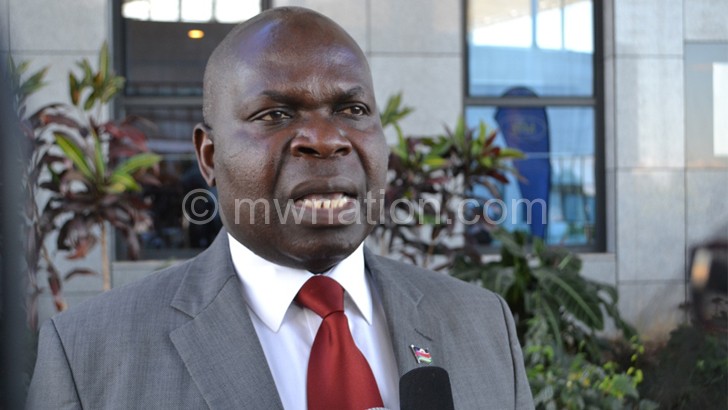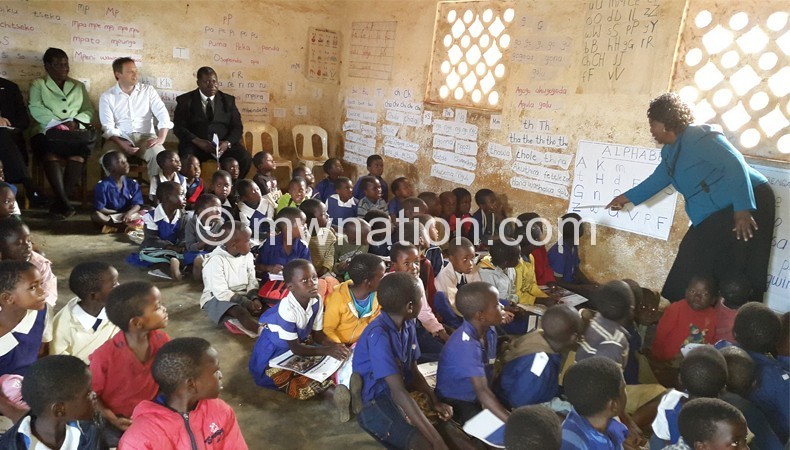Ministry launches K56bn reading programme
The Ministry of Education, Science and Technology (MoEST) has rolled out a $76.8 million (about K56 billion) National Reading Programme (NRP) to improve literacy levels of learners from Standard One to Four.
Briefing journalists in Mzuzu yesterday, Minister of Education, Science and Technology Emmanuel Fabiano said the four-year programme, effective September 5 this year, seeks to improve provision of teaching and learning materials, enhance teachers’ reading instruction skills and engage communities in the activities of public schools.

During the news conference, the minister was accompanied by United States of America International Development (USAid) education officer Michelle Chen and MoEST chief director for basic education Thokozire Banda.
Fabiano said the ministry has since printed and distributed over 2.7 million Chichewa and English books for all Standard One learners in all public primary schools nationwide for this cause.
For the 2016/17 academic year, Fabiano said the ministry has trained 21 372 personnel, including 10 518 teachers, 5 300 head teachers and 5 554 primary school infant section heads in both public and private primary schools. The training will enable the beneficiaries to acquire skills for teaching learners to read.
The ministry has also trained 1 050 trainers and 102 school inspectors.
“The National Reading Programme will facilitate the ministry’s major priority of promoting basic education that ensures that learners from Standard One to Four in all public primary schools are able to read and write in English and Chichewa at each level as projected in the Education Sector Implementation Plan [ESIP] II,” said Fabiano.
He said the reading fluency levels will be realised by improving language instruction for early grade learners in standards One to Four; promoting parental, family and community engagement in supporting learners’ reading; creating safer learning environments and access to learning for the learners; and enhancing the capacity of the ministry to sustain improvements in reading outcomes.
The NRP is informed by lessons learnt in major literacy pilots conducted in selected districts across the country over a period of time that sought to improve the quality and availability of educational materials for early grade reading.
These pilots include Malawi Break Through to Literacy (MBTL) which covered Ntchisi and Zomba rural; Malawi Teacher Professional Development Support (MTPDS) in Mzimba North, Ntchisi, Salima, Ntcheu, Zomba Rural, Blantyre Rural and Thyolo; Primary School Support Project (PSSP) in Dowa; the Early Grade Reading Activity (Egra) which was implemented in the past three years in 11 districts across the country.
These pilots unearthed many factors that hinder learners from acquiring the skills necessary for lifelong learning in the first four years of primary education.
The barriers include the use of less productive reading materials that fail to help learners decode and read earlier, inefficient use of learner textbooks and supplementary reading materials in schools and homes, parents and guardians not taking time to read to their children and help them practice reading, and insufficient time allocated for the teaching of English and Chichewa.
“The rolling out of the NRP will, therefore, address the challenges identified through the Literacy Pilots by targeting all learners in Malawi and engaging stakeholders to support the implementation of NRP to ensure that learners enrolled in Standard One to Four have an opportunity to learn to read early and read to learn in later stages of their academic careers,” said the minister.
The technical and financial assistance for the programme has been provided by USAid with an amount of over $70 million (about K50.8 billion) and the United Kingdom’s Department for International Development (DfID) which has pumped in over $6.8 million (about K5.4 billion).





